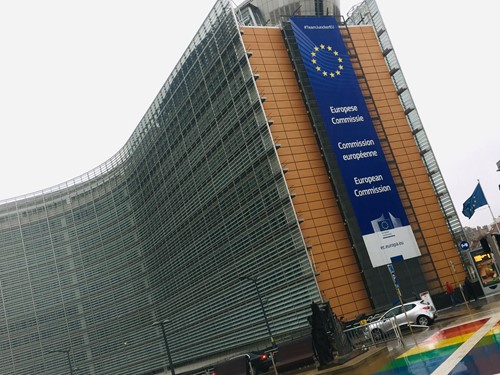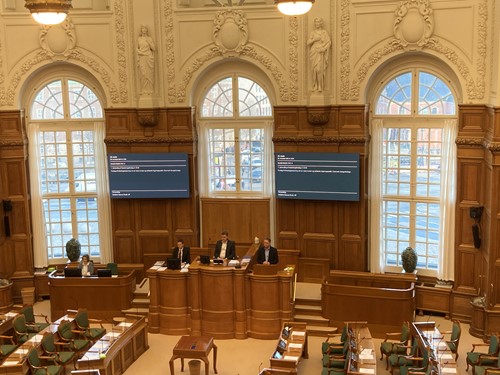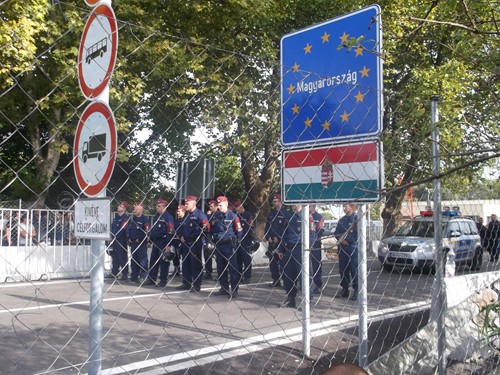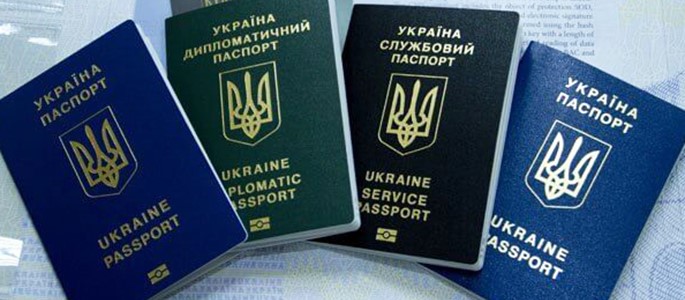Information to and about refugees from the war in Ukraine
Here are all the facts you are looking for about entering the EU and the Danish special act
Topics in this article:
• The EU Directive on Temporary Protection
• The Danish special law
• Discrimination and asylum law
• Q&A for Danes, Ukrainians and Russians
Russia's attack on Ukraine has caused a record number of people fleeing in a very short amount of time. In three weeks, almost 3 million have fled, and numbers are rising each day. By comparison, at the peak of the so-called "refugee crisis" in 2015, 1.3 million arrived in Europe in an entire year.
The EU Directive on Temporary Protection
The EU has had a directive ready since 2001 in preparation for sudden influxes of large amounts of people in need of protection. There have been strong arguments for activating it several times, including in 2015, but it has not been done before. Fortunately, it was activated on March 4, 2022.
The directive obligates all member states to grant residence permits to Ukrainians immediately, with full rights to work as well as to receive social and health services, vocational training, and for children to attend school. Initially, the residence permit is valid for 1 year, but can be extended by an additional 2 years. It also provides opportunities to transfer Ukrainians between member states and reunite separated families.
Ukrainians who have a passport are visa-free for the first 90 days and can travel freely in the EU. However, once a EU member state has issued a residence permit under the Directive on Temporary Protection, one is usually bound to that country. If you apply for asylum, you fall under the Dublin rules like other refugees.
For additional practical information for people fleeing the Ukraine, visit this EU website (in English, Ukrainian and Russian).
The Directive on Temporary Protection only covers Ukrainian citizens, stateless persons and people with refugee status in Ukraine* as well as certain family members to those. This means that the many thousands of foreign workers, students with visas, asylum seekers and people without legal residence cannot be granted residence under the directive – but they still have the right to enter the EU from Ukraine. Thus, they must try to return to their home country, or must apply for asylum.
It is worth noting that Ukraine had a very low recognition rate for refugees prior to the war (21% in 2021), and even rejected Syrians who would have been granted asylum in most EU countries. These people have now become refugees for the second time, which the EU directive does not take into account.
Another group that is left behind is Russian citizens residing in Ukraine. If they are married to a Ukrainian citizen, they are covered by the directive, but otherwise they are not – even if they are also fleeing war. Many Russian citizens living in Ukraine will be trapped between the parties of the war.
*) In 2021, there were only 2,800 recognized refugees in Ukraine in total from a population of 43 million.

The Danish special act
Due to the EU opt-out on legal issues, Denmark is not bound by the EU directive. Instead, the government has introduced a special act, which strongly resembles the EU directive. The special act enters into force on March 17th, voted through by the parties of S, V, R, SF, Ø, KD and LA. In addition, agreements have been made with the KL Local Government Denmark regarding the reception and distribution of Ukrainian refugees and concerning their access to various offers in the municipalities.
THE SPECIAL ACT GRANTS RESIDENCE PERMIT TO THE FOLLOWING GROUPS OF PERSONS:
1) Ukrainian citizens who have lived in Ukraine until February 24, 2022
2) Refugees with a residence permit in Ukraine (not stateless persons, students or workers)
3) Ukrainian citizens who resided in Denmark on February 24, 2022
– moreover:
4) Spouses/partners of the above
5) Children of the above
6) Close family members to the above who have been part of the household leading up to February 24, 2022.
7) Persons who have established a family life with the above in joint residence leading up to February 24, 2022.
Persons who fall under categories 1-3 must apply for residence from Denmark. Persons belonging to categories 4-7 can apply either from Denmark or from abroad.
RESIDENCE UNDER THE SPECIAL LAW PROVIDES:
• Residence until 17th of March 2024 with the possibility of a one-year extension, thereafter no extension.
• Right to work, school, vocational education, health services, integrational education (IGU)
• Right to self-sufficiency- and repatriation benefits (social benefits)
• Access to the integration program (including free language school and job training)
• Temporary accommodation in a municipality only 4 days after obtaining a residence permit.
Municipalities have the possibility to suspend certain deadlines and obligations for up to 3 months if they have received many Ukrainians (for instance concerning language school and daycare).
The special law does not give access to free, higher education, and when it expires, it can only be extended with one year until March 17, 2025. For that reason, it might be necessary to apply for asylum also, which can be granted beside the special law, or residence permits based on work.
You can already apply for a residence permit via an online form here. No personal interviews will be held if the case can be documented in writing. Some case processing time is to be expected before receiving the residence permit, depending on the number of applications, but the Danish Immigration Service has allocated 40 extra employees for these cases alone.
If you arrive in Denmark from Ukraine as a visa-free or on an emergency visa, you are allowed to stay in a private home from arrival, if you are able to find accommodation and if you can manage without financial benefits or health care until you get a residence permit under the special law. But if you do not have money to make ends meet, and do not have a place to live, or need medical help (other than emergency assistance), you can be accommodated in an asylum center, also without applying for asylum. Therefore, the reception center Sandholm has already been filled up in a few days.
You can have your residence application rejected under the special law if you already have citizenship or a residence permit in another country besides from Ukraine, or if you have certain types of criminal sentences or entry bans. Appeals can be made to the Immigration Appeals Board, where there is currently 2 years of waiting time. There will most likely be a group of people who cannot live up to the criteria or cannot prove that they do. They will have to go through the regular asylum procedure and may end up being rejected. Currently, all asylum cases from Ukraine are on a hold and no deportations are taking place.
Information for Ukrainians from the Danish Immigration Service can be found at nyidanmark.dk/ukraine.
Daily numbers for asylum applications from Ukrainians in Denmark can be found here.

Discrimination and asylum law
Unfortunately, the directive and the special law are necessary tools for dealing with the current crisis in a pragmatic and humane way. Paradoxically, they are necessary because EU policy has so far been and still is the exact opposite of all other groups of refugees: other refugee groups are denied access to EU territory, forced into the hands of human traffickers, isolated from society and dragged through years and years of asylum procedures with high risk for refusal, and civilian assistance is punishable.
However, most Ukrainians are already in a much better position than other refugees in terms of arrival and border control, as they are visa-free and can travel freely in the EU. But this only applies to those who have a biometric passport (issued after 2015) – others can be issued an emergency visa at the border. Many children do not have a passport at all, which causes problems.
For those who do not have a Ukrainian passport, the same rules apply as for other refugees: one must apply for asylum in the first country of entry, by which point the Dublin Regulation enters into force and prevents further travel or asylum application in another country.
It is obvious to everyone that fleeing Ukrainians should be offered security. But once again, this puts people on a collision course with the existing asylum legislation, both in the EU and particularly in Denmark. The situation in Ukraine is not dangerous enough today to trigger asylum according to the current criteria (although it may soon be). The high number of arrivals from Syria, Afghanistan, Eritrea and Iraq in 2015 were termed the "migrant crisis", despite the fact that 86% actually received asylum in Denmark according to the strict criteria that would reject the Ukrainians today. The Ukrainians fleeing the war are not personally persecuted, and the humanitarian catastrophe and the overall risk are not (yet) enough to trigger automatic protection. LGBT persons who have lived in Ukraine might however have a particular asylum motive.
In other words, it has been made so difficult to obtain asylum that a special form of residence permit has to be introduced, when there is a group that Denmark wants to help. At Refugees Welcome, we believe that special laws and privileges based on nationality should be avoided at all costs, and instead general changes and improvements should be introduced to better protect all refugees in the future, and as we see now, distribution and reception can be made more flexible all over the EU.
In the Danish system, the arrival of Ukrainians will initially have a negative impact on other refugees and asylum seekers in the country. Many have already been moved to other asylum centers and crammed together in very little space, there will be additional pressure on housing in the municipalities, and the case processing time could increase considerably. Fortunately, many refugees living here are however preoccupied with welcoming the new ones, and hopefully some of the elements of the special law can apply to everyone in the long run (for instance, the right to work and to private accommodation from the beginning, and an extension of who family reunification can apply to).

Q&A:
I live in Ukraine, how do I get to safety?
• You can enter freely in all the EU countries bordering Ukraine, whether you are a Ukrainian citizen or not.
• You can obtain residence under the EU Directive on Temporary Protection if you are either a Ukrainian citizen, married to a Ukrainian citizen or have status as a refugee or a stateless person in Ukraine.
• If you have lived in Ukraine as a student or worker, you have to either travel back to your home country or seek asylum in the first country, where you are registered.
• You are free to travel to other countries within 90 days if you are a Ukrainian citizen and have a biometric passport.
• If you wish to enter Denmark and do not hold a biometric passport, you can apply for an emergency passport at the border.
I have just arrived in Denmark, what should I do?
• If you have a biometric passport or emergency passport, you can legally stay with friends or family and apply for residence under the special act. You must pay for medical care yourself, unless it is an emergency (emergency room, ambulance assistance).
• If you cannot manage without the help of the state (housing, food, etc.), you can go to a kommune or an asylum center, you don't have to apply for asylum. You will be provided with a bed, food, hygiene items and access to a doctor, maybe in an asylum center.
• You do not have the right to work, and your children cannot attend a real school until you have been granted a residence permit under the special act.
• You can ask to be appointed the same municipality as family or friends, but there is no guarantee for that.
I live in Denmark, how can I help?
• Many drive from Denmark to Poland to pick up Ukrainians, but we recommend that you only do so if you already know someone ready for pick up and have contact with them. Trains, ferries and buses are free for Ukrainians across the EU, and many are in doubt about where they want to go and do not know if they can trust you.
• A number of municipalities are coordinating private accommodation - if you have a spare room, a guest room, an annex or a holiday home, contact your own municipality and ask if there is a need.
• If you own a company, or work in a large company, ask your local job center if you can help provide an initial internship for a newly arrived refugee - it is not only Ukrainians but also other refugees who need help finding a job.
• If you have family members in Ukraine that you would like to bring here, they will not be covered by the special act, as you have not lived together until the war (an exception, however, are spouses and minor children).
I am a Russian citizen and against the war, what can I do?
• It is usually relatively easy for Russians to get visas to visit friends and family, attend conferences and so on in Denmark. But currently you might have a very hard time traveling out of Russia.
• If you succeed in coming to Denmark or other EU countries, you can apply for asylum if you are a military conscientious objector or if you have been openly critical of the war, which would probably trigger conventional asylum status.
Is Denmark a good country to choose?
• That is hard to say, as there are both pros and cons. In the short term, the Danish state can offer more support than most other countries in the EU, and decent accommodation is still available. However, once the residence under the special act expires, it is much more difficult to extend your legal stay or to obtain permanent residence and citizenship in Denmark. This is considerably easier in other EU countries.
• Denmark lacks labor force, and a good deal of Ukrainians are already living here due to work. But they typically work in unskilled and low-paid jobs, such as agriculture. Most jobs with good conditions and good salaries require extensive Danish language skills and education. Degrees from abroad are rarely recognized in practice.
• ECRE has made an information sheet about reception of refugees from Ukraine in different countries.
Need further advice? Contact Refugees Welcome here
Refugees Welcome survives only
on memberships and donations,
your support makes a difference!


